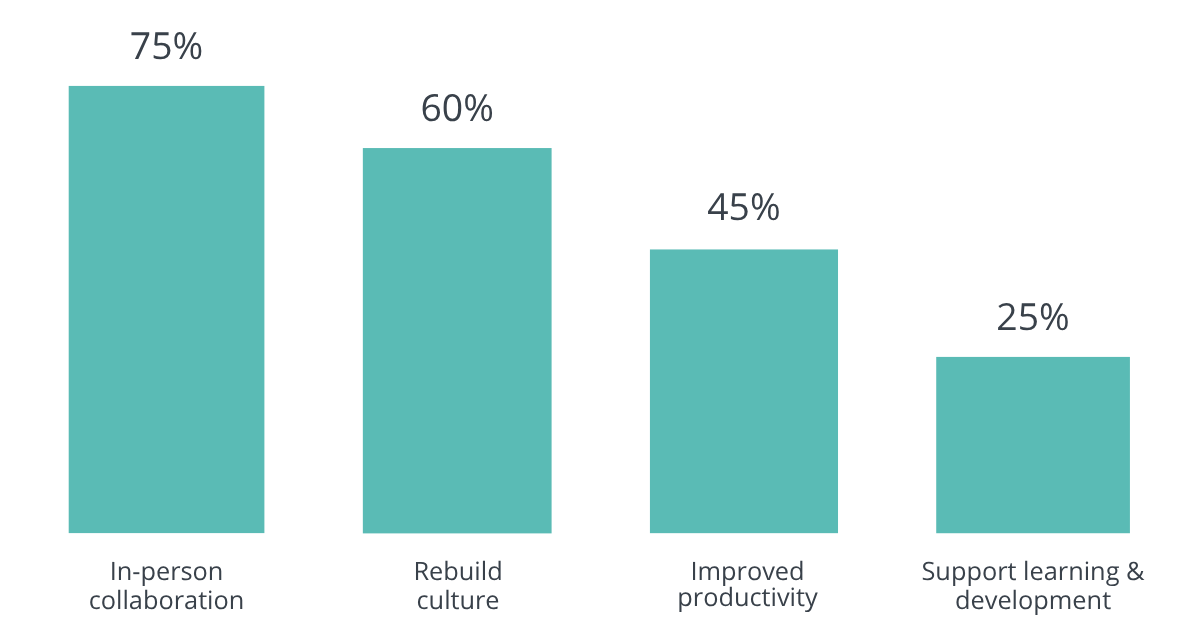
New study shows hybrid working still matters in 2025
.jpg?width=730&height=380&name=Heading%20(1).jpg)
The conversation around flexibility in the workplace has shifted again - from reactive policy to long-term strategy. As flexible working has remained a hot topic since COVID – we are now we’re seeing the market evolve (once again!)
Across the board, more organisations are tightening hybrid arrangements and asking employees to return to the office - some softly, others with strict mandates.
In this year’s Digital, Marketing & eComm in Focus Report 2025 written in partnership with Six Degrees Executive & Arktic Fox, we surveyed over 200 industry leaders – and without surprise - flexibility emerged as one of the strongest differentiators when it comes to attracting and retaining top talent.
What the market is telling us, right now
According to our 2025 report, 86% of organisations now require employees to be in the office at least two days per week, with three days becoming the most common arrangement across the sample.
When we asked the very leaders who call the shots on implementing the shift back toward office-first models, the answers varied:

These drivers are understandable and reflect the shift in market – as the organisational benefits of in-person collaboration simultaneously has proven to rebuild culture and productivity.
To mirror this - when the Productivity Commission, cited by the Australian Financial Review, released its most extensive review into remote work, they concluded that hybrid work tends to be either neutral or beneficial for productivity.
The findings stated that hybrid work supports collaboration, without requiring full-time in-office presence - but younger and less experienced employees benefit from in-person mentoring.
They also concluded full-time remote work can hinder productivity, but flexible models help retain staff and expand access to talent.
Put simply, flexibility done right, with trust and strong mutual understanding - isn’t a risk to productivity and rather a pathway to greater retention and employee satisfaction.
But these results can only tell one side of the story.
What candidates are telling us
Maya Wettenhall, Associate Director at Six Degrees Executive, says many candidates are weighing up hybrid models as a key factor in whether to take on a new role:
“More than ever, flexibility and purpose are what candidates value. They want to work for businesses that trust them, and that enable both career growth and personal balance.”
This aligns with the report's findings, where flexibility was directly linked to career decision-making. Many candidates said unclear hybrid expectations were enough to make them look elsewhere.
What’s clear from the conversations with candidates is that it really comes down to trust, because flexibility looks different for everyone.
Without a doubt, the organisations seeing strong engagement and retention are those that lead with autonomy, clear communication, and outcomes-focused leadership.
The 2025 report also confirms this shift - with flexibility now playing a direct role in motivating candidates to consider new roles. Employers who adapt their models to reflect this will be more likely to attract quality talent.
Jo Krause, who leads our Contracting team in Melbourne, sees this play out across permanent and interim markets:
“We’re seeing clients trying to drive people back into offices, but the reality is - if you want to attract top talent, you need to offer flexibility. The smartest businesses are treating flexibility as a long-term strategy, not a short-term fix.”
What this means for hiring and retention
Hybrid mandates without clarity or value-add are pushing talent away - while flexible structures that prioritise trust and purpose are building loyalty.
In 2025, candidates are looking for:
- Defined hybrid expectations, not vague guidelines
- Managers who support autonomy
- Opportunities to contribute meaningfully, without giving up balance
The In Focus Report reinforces this by stating 45% of businesses now operate under a 3-day hybrid minimum.
This shows a clear opportunity for employers to differentiate by designing hybrid models that balance autonomy with connection.
For employers, outlining expectations is important, but the key is delivering them in ways that align with how teams operate, collaborate, and succeed.
Because as a hiring manager and leader, building a workplace where people feel trusted and supported is the key to retention.
The companies getting this right are listening to what their people need, clearly communicating hybrid expectations, and creating structure around flexibility that feels human, not transactional.
The 2025 report offers deeper insights into what’s shaping talent behaviour, hiring decisions, and workplace culture. Download the full Digital, Marketing & eComm in Focus Report below.
Related


Stay ahead of the EOY crunch with contracting
Even though December comes around the same time every year, somehow it still manages to hit us with...
.jpg?width=352&name=FMCG%20Sales%20-%20Blog%20(3).jpg)
FMCG Sales: 2025 Trends & Hiring Challenges
In a market defined by consolidation, and caution, FMCG Sales leaders are facing increased pressure...

 Accessibility
Accessibility
